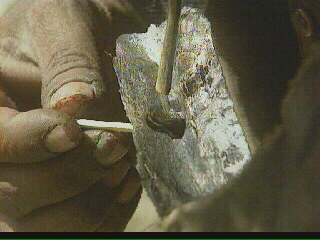Drug Growers
God and drugs in Northern Pakistan
 Growing hasish and opium is part of the culture of Pashtun tribes in northern Pakistan. Many depend on it for their livelihoods. The government is determined to crack down on the illegal trade, but the farmers are heavily armed and a peaceful resolution seems unlikely. Whether it is the farmers at fault, or whether they are simply cashing in on a lucrative trade for their own survival, remains controversial.
Growing hasish and opium is part of the culture of Pashtun tribes in northern Pakistan. Many depend on it for their livelihoods. The government is determined to crack down on the illegal trade, but the farmers are heavily armed and a peaceful resolution seems unlikely. Whether it is the farmers at fault, or whether they are simply cashing in on a lucrative trade for their own survival, remains controversial.
"For 30 years we've been growing poppies. Our major source of livelihood is first God, then opium" says Fez Mohammed, chief of the village of Dogram. Armed resistance is their only way to fight their government's 'Holy War' on drugs. For the farmers, the opium is not seen as a drug but a profitable cash crop - and an essential one, as survival without that income would be unlikely to be possible. With weapons like the AK47 freely available in Darra (the arms capital of North West Pakistan) neither side will back down. Pakistan authorities don't dare close the multitude of heroin labs - they fear rebellion, although Mawaz Malik of the Pakistan Narcotics Control Board predicts that future violence is likely. "If the situation demands then I think the government is determined to use force also." Last time the government took on the Pashtun, ninety people were killed. Given viable alternative industries and jobs, the Pashtun people say they will abandon the poppy. Now, there is little hope of that with a government which now spends 80% of its budget on its military and the servicing of its national debt.
FULL SYNOPSIS

